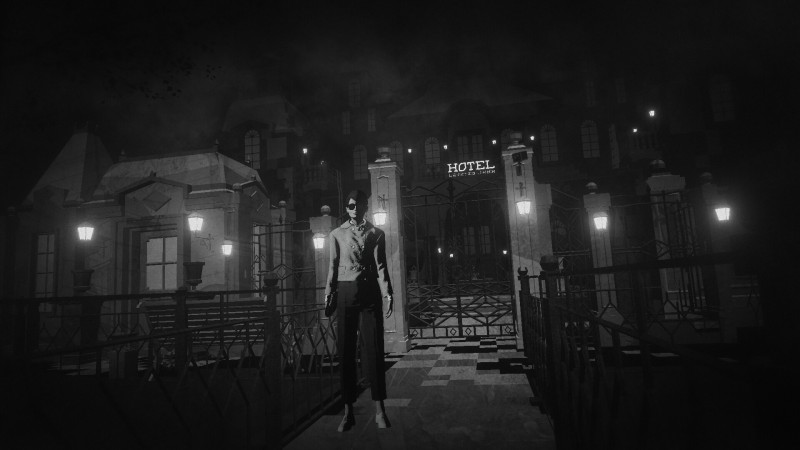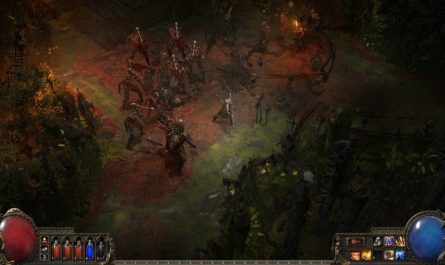Reviewed on:
Switch
Platform:
Switch, PC
Publisher:
Annapurna Interactive
Developer:
Simogo
Release:
May 16, 2024
Lorelei and the Laser Eyes’ setup is bland compared to the others in the puzzle genre. You are a bespectacled woman carrying a clutch who walks with incredible poise into a mansion with little understanding of why you are there or what you are doing. The lack of context doesn’t matter, though, because the game immediately showers you with an incredible sense of mood. You may not know why you are petting the dog in the courtyard, checking every door, or reading every scrap of paper you come across initially, but you want to be there and see everything the game has to offer. And if you’re like me, it morphs from a want to a need that keeps you up entirely too late, pointing your phone’s flashlight at a piece of scrap paper already overflowing with notes incomprehensible to any outside observer.
To speak too much about the game’s story would betray its intent, but know that while initially, the plot seems amorphous, it is all leading to something, I promise. Disparate news articles, books about lunar cycles, typed monologues about the nature and purpose of art, and incomplete film scripts all paint emotion about what happened in this hotel/mansion, but its final moments surprised me at how sharply it pulled everything into focus. What begins as effective but seemingly abstract tone-setting poems all make sense in the final moments, and I was impressed by the satisfying slow burn of the narrative.
The game’s puzzles are the stars of the show, and Lorelei is overflowing with them. The ultimate goal is to explore the house and open every door, find every document, and unlock every lock. Sometimes, that involves reading to find a year that can be used to open a four-digit padlock. Sometimes, it involves entering a 32-bit horror video game and making it crash so you can take note of its error message documentation.
Like any good puzzle game, the conundrums are based on a core idea but expanded exponentially to lead you to solutions you never considered. In Lorelei’s case, it is primarily simple math. You will need a calculator (and one is provided in-game), but you won’t be doing much more than adding and subtracting and taking copious notes. The puzzles consistently made me feel smart without ever going off the deep end in a way I admired. I certainly got stuck – extremely stuck on a few occasions – but when I finally arrived at a solution, I never felt cheated by the puzzle itself.
Where I did occasionally feel cheated was when I would sometimes hit literal walls where I had parts one and three to a puzzle, but simply couldn’t find two. At least 3 hours of my approximately 20-hour playtime was spent aimlessly wandering the halls looking for anything that would help me take the next step, only to discover I had missed a prompt on a wall sconce that would open a secret passage. That moment felt less like I couldn’t decipher a secret lock as much as I never saw the lock in the first place. In those moments, I was frustrated with Lorelei and the Laser Eyes, but to its credit, I was so immediately enamored with the game that I knew I wanted to finish it from its opening moments.
I don’t know that you can consider yourself a successful puzzle game if you don’t hit at least some confusing barriers that feel impassable. Finally overcoming those hurdles is what makes the genre so compelling, and Lorelei and the Laser Eyes finds that successful balance of making you feel smart more often than it makes you feel dumb. Couple that with a mystery worth unraveling, fourth-wall-breaking commentary, and unexpected reality-bending moments sending you to bizarre places, and you are left with a fantastic puzzle game that I already wish I could play again for the first time.
Score:
8.75
About Game Informer’s review system
PurchaseReviewed on:
Switch
Platform:
Switch, PC
Publisher:
Annapurna Interactive
Developer:
Simogo
Release:
May 16, 2024
Lorelei and the Laser Eyes’ setup is bland compared to the others in the puzzle genre. You are a bespectacled woman carrying a clutch who walks with incredible poise into a mansion with little understanding of why you are there or what you are doing. The lack of context doesn’t matter, though, because the game immediately showers you with an incredible sense of mood. You may not know why you are petting the dog in the courtyard, checking every door, or reading every scrap of paper you come across initially, but you want to be there and see everything the game has to offer. And if you’re like me, it morphs from a want to a need that keeps you up entirely too late, pointing your phone’s flashlight at a piece of scrap paper already overflowing with notes incomprehensible to any outside observer.
To speak too much about the game’s story would betray its intent, but know that while initially, the plot seems amorphous, it is all leading to something, I promise. Disparate news articles, books about lunar cycles, typed monologues about the nature and purpose of art, and incomplete film scripts all paint emotion about what happened in this hotel/mansion, but its final moments surprised me at how sharply it pulled everything into focus. What begins as effective but seemingly abstract tone-setting poems all make sense in the final moments, and I was impressed by the satisfying slow burn of the narrative.
The game’s puzzles are the stars of the show, and Lorelei is overflowing with them. The ultimate goal is to explore the house and open every door, find every document, and unlock every lock. Sometimes, that involves reading to find a year that can be used to open a four-digit padlock. Sometimes, it involves entering a 32-bit horror video game and making it crash so you can take note of its error message documentation.
Like any good puzzle game, the conundrums are based on a core idea but expanded exponentially to lead you to solutions you never considered. In Lorelei’s case, it is primarily simple math. You will need a calculator (and one is provided in-game), but you won’t be doing much more than adding and subtracting and taking copious notes. The puzzles consistently made me feel smart without ever going off the deep end in a way I admired. I certainly got stuck – extremely stuck on a few occasions – but when I finally arrived at a solution, I never felt cheated by the puzzle itself.
Where I did occasionally feel cheated was when I would sometimes hit literal walls where I had parts one and three to a puzzle, but simply couldn’t find two. At least 3 hours of my approximately 20-hour playtime was spent aimlessly wandering the halls looking for anything that would help me take the next step, only to discover I had missed a prompt on a wall sconce that would open a secret passage. That moment felt less like I couldn’t decipher a secret lock as much as I never saw the lock in the first place. In those moments, I was frustrated with Lorelei and the Laser Eyes, but to its credit, I was so immediately enamored with the game that I knew I wanted to finish it from its opening moments.
I don’t know that you can consider yourself a successful puzzle game if you don’t hit at least some confusing barriers that feel impassable. Finally overcoming those hurdles is what makes the genre so compelling, and Lorelei and the Laser Eyes finds that successful balance of making you feel smart more often than it makes you feel dumb. Couple that with a mystery worth unraveling, fourth-wall-breaking commentary, and unexpected reality-bending moments sending you to bizarre places, and you are left with a fantastic puzzle game that I already wish I could play again for the first time.
Score:
8.75
About Game Informer’s review system
PurchaseRead MoreGame Informer


